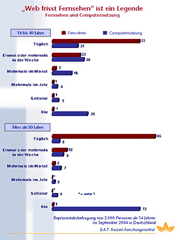Leisure Time Monitor 2004
Many fitness machines are said to be quietly rusting away in private basements. Are home computers facing a similar fate? According to the Federal Statistical Office, almost two-thirds (61%) of all private households in Germany are equipped with a PC – yet only one in seven Germans (13%) uses it daily, as determined by the BAT Leisure Research Institute in its recently published Leisure Monitor 2004. The survey, representative of the German population, polled 3,000 people aged 14 and over about their leisure and media habits.
A slight majority of Germans (53%) honestly admit to using a PC at home "maybe once a year," less often, or never. "For private consumers, the computer is primarily a communication and entertainment medium and only occasionally an information or shopping platform," says Prof. Dr. Horst W. Opaschowski, head of the institute. "In the internet market, there are more viewers than buyers. Shopping with a mouse click is not a mass market." Just under a quarter of the population (24%) has already used the possibilities of online shopping. Almost four times as many Germans (88%) enjoy shopping more frequently. The internet still has little to offer in terms of experiential consumption.
The results of the BAT Leisure Monitor remain sobering:
More than two-thirds of Germans (70%) state that they have never used online shopping or e-commerce services. The internet revolution has not reached most consumers. The "digital divide" in Germany persists: only 6 percent of secondary school graduates use online banking regularly (at least once a week); the proportion of respondents with a grammar school education is more than four times higher (26%). Opaschowski: "The digital divide is primarily an educational problem and less a question of internet access or technical skills. Internet access cannot compensate for educational deficiencies, i.e., shortcomings in school and vocational training.""
Even in 2004, half of all Germans did not use the internet (53%). The most active internet users – compared to the 55+ generation (18%) – were young people up to the age of 34 (73%), who, however, used the PC less as a source of information and primarily as an entertainment medium, i.e., for chatting or downloading games and music.
""The web devours television" is a legend.
The prediction by American computer scientists – "The web will devour television" – has not come true in Germany. The PC, as a gateway to cyberspace, has remained a niche medium for German consumers compared to television, a mass medium. Professor Opaschowski: "The predicted battle for dominance – 'PC instead of TV' – is not happening. Television has lost none of its appeal. TV ratings remain stable, and new media are adding to the mix.""
For more than forty years, Germans have favored television, radio, and newspaper reading when it comes to media consumption. This remains unchanged today. Regular leisure activities (at least once a week) still include watching television (97%), listening to the radio (91%), and reading newspapers (84%). The vast majority of the population clings to their old habits. Watching television or DVDs is simply easier and more convenient.
Most people lack not only the money but also the necessary time for the latest technological innovations in the media market. Intensive multimedia use doesn't save time; rather, it acts as a time trap and consumes consumers' time resources. Therefore, many people prefer to exercise (33%), cycle (36%), or go out with friends (28%) after work instead of staying home alone online.
The new comprehensive data volume „Leisure Monitor 2004“ contains – listed according to socio-demographic characteristics such as gender, age, education, income, life phase, etc. – detailed information on 60 different leisure activities, from television and PC to museum and theatre, to voluntary work in church, party, trade union or association.
The representative survey of 3,000 people aged 14 and over was conducted between September 7th and 27th, 2004.
The data volume „Leisure Monitor 2004“ is available as a study or CD-ROM for a nominal fee of 98.00 euros from BAT Freizeit-Forschungsinstitut GmbH, Alsterufer 4, 20354 Hamburg (Fax: 040/4151 2091 and on the Internet at www.bat.de/freizeit).



